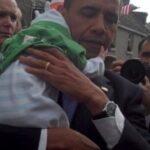‘Trump’s speech can be seen as a kind of unintentional parody of the contempt with which previous US leaders have treated the UN and world opinion’
Opinion
Daniel Geary: Trump’s contempt for the United Nations builds on a long American tradition
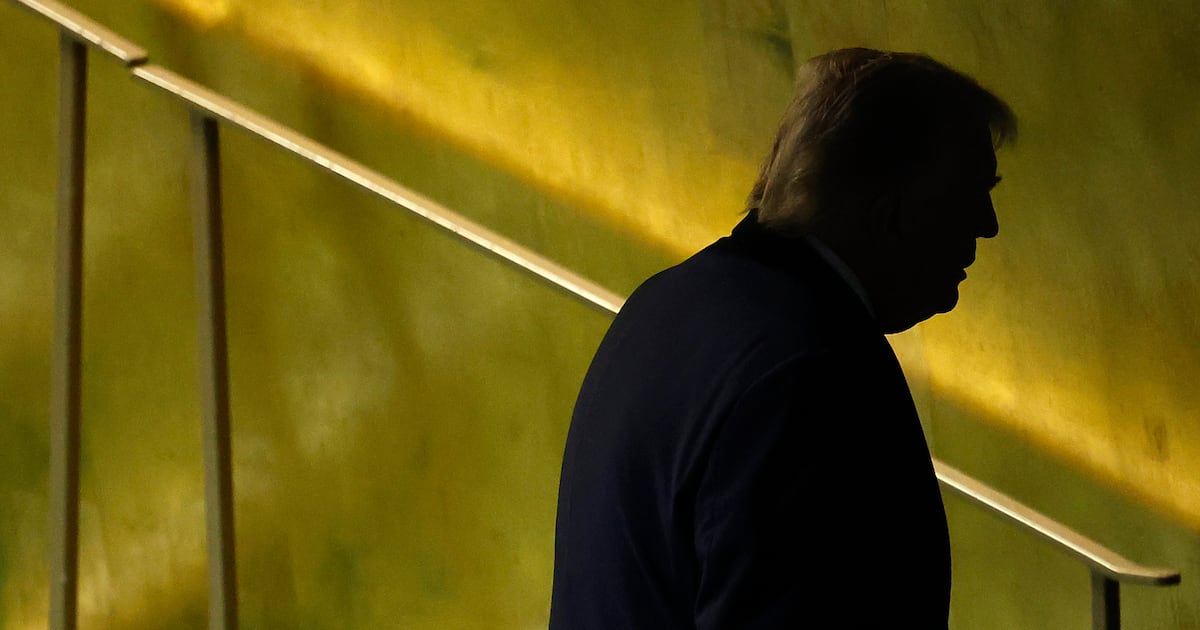
Read more on post.
The founders of the United Nations must be rolling in their graves. This venerable world institution, now celebrating its 80th birthday, was born of the ideal that conflicts could be settled by dialogue rather than by force. The US was central to the UN’s founding, but on Tuesday its delegates were treated to a speech by an American president that should be cited in a future thesaurus as the opposite of “diplomacy”.
Donald Trump’s rambling monologue was a mixture of outright falsehoods, petty grievances and hectoring. He said he had personally ended seven wars – though it’s far from clear which seven they were. He railed against the “greatest con job ever perpetrated on the world”, denying the man-made warming of the planet that threatens the survival of our species. He even criticised the UN for having previously declined his bid to renovate its headquarters back when he was just a property developer.
Trump did not open a dialogue, he basically told world leaders to shut up and listen to him. It was as though he were claiming that everyone should follow his lead because “I’m really good at this stuff” – except those were his exact words. “Your countries are going to hell,” he told European leaders, whom he claimed were failing to adequately check migration.
The pugnacious and improvisational style of Trump’s presentation, which we have come to expect, is truly one of a kind. This is after all the same man who earlier this week at the funeral of Charlie Kirk contradicted a grieving widow to insist that “I hate my opponent.”
[ America’s accelerating exit from itselfOpens in new window ]
But though his remarks and tone were extraordinary, the content of Trump’s UN remarks reflect the broader Maga movement. Maga has seen the triumph of an “America First” foreign policy with deep roots in the American Right. This current of thought rejects any American responsibility for world peace and order, instead asserting the US power to act unilaterally as it sees fit. It traces back to the America First movement that sought to keep the US out of the second World War, led by aviator and a man often thought of as a Nazi sympathiser, Charles Lindbergh. During the Cold War years, America First took a back seat to the necessity of defeating Communism. But since the Cold War ended, it has once again reared its ugly head.
The United Nations has long been a bugaboo for America Firsters. At its inception, they criticised it as a form of “world government” that would compromise US sovereignty. The voice the UN gave to the decolonised nations of Africa and Asia, and the anti-racist stands it took (for example, against apartheid in South Africa) earned it the scorn of white supremacists. Rightwing Protestants saw it as ungodly. In the bestselling Left Behind novels of evangelical preacher Tim LaHaye, the former head of the UN is the literal Antichrist.
Yet it is not just the American right that has undermined the UN. The five nations of the Security Council were given a veto power, designed to restrain the institution’s democratic principles. The US has frequently used its power to veto policies that practically all other nations support – especially in the case of Israel/Palestine. And Trump is hardly the first US president to fail to honour the nation’s financial commitment to the body.
Trump’s speech can be seen as a kind of unintentional parody of the contempt with which previous US leaders have treated the UN and world opinion. Who could forget the notorious 2003 speech that US secretary of state Collin Powell gave to the Security Council on the eve of the Iraq War, seeking support for a destructive, illegal and unnecessary war that the US had already decided to wage? Powell humiliated himself by offering false evidence of Iraqi programmes of mass destruction and ties to al-Qaeda that failed to convince most world leaders.
But scorn for the UN and its principles has not just come from Republicans. Former US president Joe Biden spoke of defending democracies worldwide and of rebuilding multilateral relationships after the first Trump administration. And in some cases he did so. But he prevented the UN from stopping the Israeli genocide in Gaza. Four times under Biden’s watch, the US vetoed ceasefire resolutions. And Biden ignored a ruling by the International Court of Justice, the principal judicial organ of the UN, that Israel was committing a probable genocide against the Palestinian people.
One thing Trump said in his speech was certainly true: the UN is an often ineffective institution offering mere “empty words”. But the principal reason why the UN’s power has been so limited has been because the US wants it that way. What Trump has made clear is that those who hope for a world based on the principles of dialogue, democracy and peace cannot look to the US for hope, if ever they once should have.
Fortunately, there are some in the world who still voice support for those principles. One of them is Brazilian president Luiz Inácio Lula da Silva, who addressed the UN just before Trump. Lula said: “All around the world, anti-democratic forces are trying to subjugate institutions and suffocate freedoms. They worship violence, glorify ignorance, act as physical and digital militias, and restrict the press.” If the ideals of the UN are to survive this century, then the vision of Lula must triumph over the destructive megalomania of Trump.
Dr Daniel Geary is Mark Pigott professor of US history at Trinity College Dublin
Opinion
Norway’s king and queen faced a serious accusation on Netflix – here’s why Norwegians rushed to defend them | Shazia Majid

Read more on post.
When Netflix released the documentary Rebel Royals: An Unlikely Love Story last week, the world got another glimpse of the unconventional romance between Princess Märtha Louise of Norway and her American husband, Durek Verrett – a self-styled shaman and spiritual healer to Hollywood celebrities. The pairing has been controversial in Norway: Märtha Louise stepped down from her official duties before marrying Verrett, the couple have a history of promoting pseudoscientific beliefs, and Verrett – who is black – has long been the target of racist abuse. It is on this last point that Verrett used the programme to deliver a stinging critique of his in-laws, King Harald and Queen Sonja.
“Most people who are white are trained to listen to white people and not to people of colour,” he says in the film. “Her father, her mom, her brother … they didn’t even know what racism was. They would look at me like I was crazy when I would say there’s racism.”
It makes for dramatic television. But the portrayal of the king and queen as naive, out of touch and even prejudiced is not just misleading, it distorts what they represent in Norway. In fact, for families like mine, the royal couple became a rare unifying force in a society still learning what diversity meant.
International viewers might see this as an echo of Britain’s Windsors, glamorous, scandal-ridden, polarising figures who dominate headlines – whereas the Norwegian royals may come across as quieter, less visible, and largely uncontroversial. In reality, Harald and Sonja have been moral anchors in a country that only began receiving significant immigration from Asia and Africa in the 1970s. They wield no political power, yet their authority carries weight. For many Norwegians with immigrant backgrounds – myself included – the royal couple have been among the few who have consistently spoken of us as belonging.
That is why Verrett’s accusations have provoked fury and widespread rebuttals. This groundswell of support was not engineered by the palace: citizens spontaneously rallied behind their king and queen.
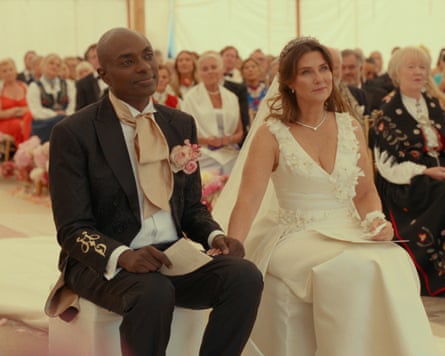
Some of the loudest voices have come from minority communities. On a prime-time debate show days after the Netflix documentary premiered, queer activists and representatives from religious groups, disabled communities, anti-racist networks and women’s organisations lined up to testify to the couple’s inclusivity.
The examples are not hard to find. In 2016 the king declared: “Norwegians have come from Afghanistan, Pakistan and Poland, Sweden, Somalia and Syria.” For tens of thousands of us, that single line cut through the online hate telling us we would never be “real Norwegians”. Inclusion and diversity have not been symbolic gestures, but the king’s life’s work. In his New Year’s Eve speech in 2007 the king addressed racism directly: “We are constantly reminded that humanity and mutual respect cannot be taken for granted. Xenophobia, everyday racism and violence are part of the news picture. Tolerance can be enshrined in law – but prejudice against those who think differently has its roots in the human mind. It is there that the battle must be won.”
Sonja, who was not born a royal and fought for nine years to be allowed to marry Harald, has channelled her own experience of exclusion into decades of advocacy for women and minorities. In a small, homogeneous country, these gestures have mattered.
None of this means Norway is free of racism. Its recent politics underscores the tension: in the last election, an anti-immigration party made surprising gains, indicating how fragile social cohesion feels in a time of heightened polarisation. Verrett’s personal experiences of prejudice deserve acknowledgment. But to brand the monarchs as ignorant or racist does more harm than good. If every criticism is recast as racism, the term itself is emptied of power – leaving those most affected less protected.
Verrett’s own controversies also matter. In Norway, he has been criticised less for his skin colour than for his actions: selling amulets he claimed could protect against Covid, or suggesting childhood cancer is caused by unhappiness. His self-promotion jars with Nordic norms of modesty. Conflating cultural disapproval with racial bias only deepens mistrust.
The lesson is larger than Norway. Public figures invoking racism carry responsibility: their words can clarify, but they can also obscure. If we want the fight against discrimination to succeed, we must name real prejudice when we see it – and also recognise genuine allies, even when imperfect.
For all their privilege, King Harald and Queen Sonja have opened doors, literally and figuratively, to those once shut out. They deserve better than caricature. And Norway – like every democracy – deserves a conversation about race that confronts hard truths without collapsing into distortion.
-
Shazia Majid is a columnist at the Norwegian newspaper VG
-
Do you have an opinion on the issues raised in this article? If you would like to submit a response of up to 300 words by email to be considered for publication in our letters section, please click here.
Opinion
When Governments Put a Price on Everything
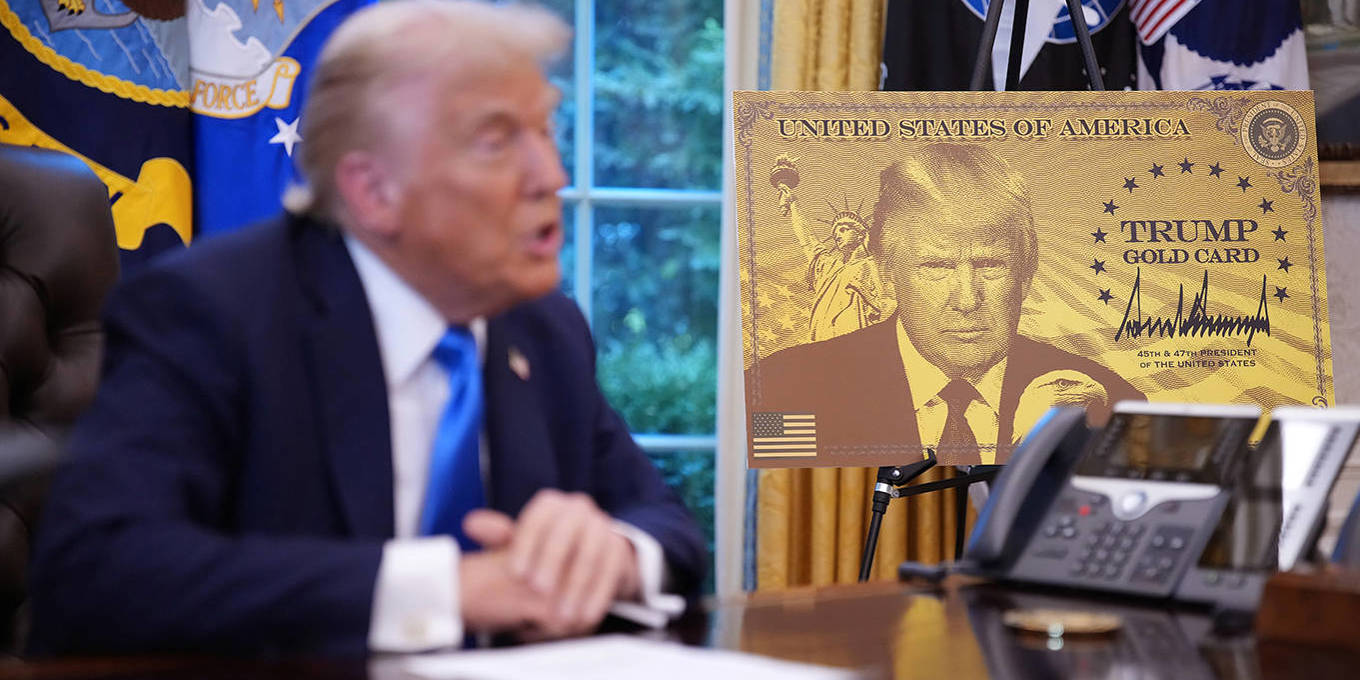
Read more on post.
FRANKFURT – US President Donald Trump recently announced that professional work visas (H-1Bs) for the United States will now cost sponsoring institutions $100,000. This is not a fee; it is the price that any company or university that wants to hire a foreigner must pay. Visas have become transactions, and so, too, has naturalization: the White House is selling “Trump gold cards” that grant a quick path to permanent residency, and eventual citizenship, for $1 million.
Opinion
The next big financial crisis may be brewing. Warning signs are already there | Larry Elliott

Read more on post.
US job creation has stalled and, despite the curbs on migration, unemployment is rising. Tariffs are pushing up the cost of imports. And Donald Trump is at war with the governor of his own central bank and wants him out.
But traders on Wall Street are not bothered by the fact that inflation is above the target or that growth is slowing. Share prices are testing new record levels on an almost daily basis. Jerome Powell, the man Trump wants to be rid of, says stocks are “fairly highly valued”, which is an understatement if ever there was one. By historical standards, stocks are extremely highly valued. There is trouble – perhaps big trouble – ahead.
Recessions happen rarely and the same goes for financial crashes. Both are predicted more often than they materialise. Leaving to one side the exceptional circumstances of the 2020 pandemic, it has been 17 years since there was a prolonged fall in share prices. Memories of the slump that followed the collapse of Lehman Brothers 17 years ago this month have dimmed. Traders in their 20s and 30s have little or no experience of what a genuine financial market panic feels like.
That’s the first warning sign. The longer the period between crises, the greater the complacency, the sense that the good times will go on for ever. Those who note that all previous booms have ended in painful busts are ignored. The old lie – it’s different this time – is trotted out.
The belief that the party will continue has pushed share prices ever-higher in New York and London, even though the reasons for the optimism are tenuous. In the UK, the economy is barely growing while inflation is running at almost double the Bank of England’s 2% target. As was the case last year, constant speculation about tax rises to be announced in the budget is hitting consumer and business confidence.
The record-breaking run of share prices on Wall Street is the result of a bet that artificial intelligence will raise the economy’s growth rate. That may happen, but it will be years before the impact is felt. The same was said of the IT boom that propelled share prices to dizzying heights in the late 1990s. It wasn’t different that time either.
No two market crashes are alike. The current state of affairs feels different from 2008, when the crash was caused by the overexposure of banks to the US housing market, and turbocharged by the widespread use of new financial instruments that were supposed to reduce risk but did the opposite. If there are parallels, they are with the recession-triggered stock market setbacks of the 1970s and early 1980s, when downturns were deliberately engineered to combat high inflation.
All of which makes the power struggle between Trump and Powell pivotal. Despite what the president might say, the performance of the US economy is mediocre at best, although the weaknesses have been disguised by the fact that the better-off have been doing just fine. The top 10% of earners account for almost half of consumer spending – the highest level since the late 1980s.
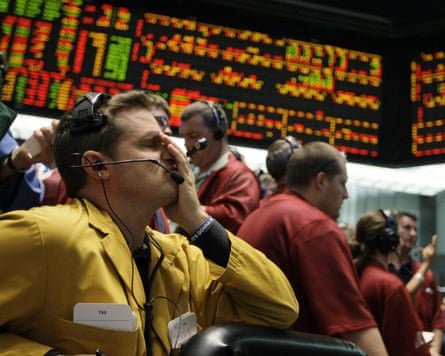
The bias towards the rich is nothing new but creates its own risks. Exposure to the stock market has never been higher, with 30% of the wealth of Americans accounted for by shares. Since share ownership is concentrated among the better-off, the US economy is relying on the Wall Street boom continuing, and for the rich to carry on spending their gains.
Americans trying to get by on low and middle incomes are not so fortunate. Since the end of the pandemic, they have seen their real incomes pretty much flatline. As one Wall Street analyst, Mark Zandi, put it, the fate of the US economy lies in the hands of the well-to-do. “As long as they keep spending, the economy should avoid recession, but if they turn more cautious, for whatever reason, the economy has a big problem.”
One obvious reason for the rich to turn more cautious would be a fall in share prices. If that happened, their wealth would take a hit and they would spend less. Growth would slow. Add in the negative impact of tariffs and there would be a genuine threat of recession next year. In those circumstances, Powell and his colleagues at the Federal Reserve would be expected to support share prices by cutting interest rates. Indeed, it is Wall Street’s certainty that the US central bank will bow to Trump’s pressure to do so that is preventing share prices from falling.
after newsletter promotion
Since the 1970s, central banks have prized low inflation over full employment, which has been good for owners of capital but not so good for labour. As Dario Perkins of the research firm TS Lombard puts it, just as trade unions were the custodians of full employment immediately after the second world war, so central banks were the custodians of neoliberalism. While ostensibly independent, they made sure that capital triumphed in the fight against labour – and carried on winning. In both the global financial crisis of 2008 and the pandemic, central banks took aggressive action to put a floor under share prices.
So Powell may well deliver, but he may not. The Fed has twin targets: to keep inflation at 2% over time and to support employment. Inflation is running at just under 3% so there is now a choice: keep interest rates higher than the markets expect in order to tame inflation, or ditch the inflation target to justify interest rate cuts.
Either way, the prospects are not good. If the Fed resists the pressure for cheaper borrowing, it increases the chances of the US economy falling into recession. If it bows to the pressure, it will keep the stock market bubble inflated – for now at least – but at the risk of higher inflation. This could well trigger a backlash from the bond markets, which in effect set the interest rates for mortgages and servicing the US national debt, currently 124% of GDP.
It is always easier to be wise after the event and identify the causes of stock market crashes with the benefit of hindsight. There should be no such problem this time. In the months to come, we shall see whether the bull market can survive the president’s attempt to set US interest rates from the White House. Wall Street seems untroubled by this. It shouldn’t be.
-
Larry Elliott is a Guardian columnist
-
Culture2 days ago
Taylor Swift’s new cinema outing generates more than €12million in just 24 hours
-
Environment1 week ago
Chimps drinking a lager a day in ripe fruit, study finds
-
Politics2 days ago
European Parliament snubs Orbán with vote to shield Italian MEP from Hungarian arrest
-
Culture2 weeks ago
Life, loss, fame & family – the IFI Documentary Festival in focus
-
Health3 days ago
EU renews support for WHO’s Universal Health Coverage Partnership
-
Culture2 days ago
Twilight at 20: the many afterlives of Stephenie Meyer’s vampires
-
Environment5 days ago
Key oceans treaty crosses threshold to come into force
-
Culture2 months ago
Fatal, flashy and indecent – the movies of Adrian Lyne revisited

















